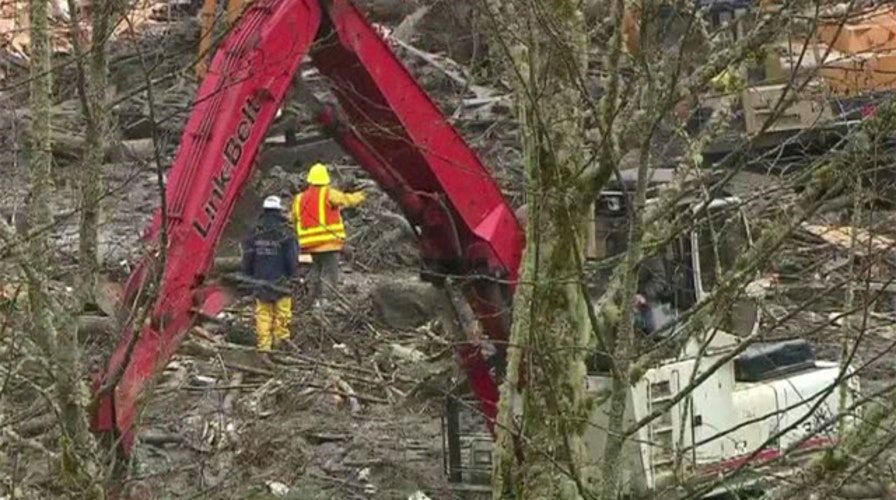Authorities in Washington state said Sunday that dog teams assisting in the search effort after last week's deadly mudslide would be given two days off as the official death toll increased from 18 to 21.
The dogs can lose their sensing ability if overworked in the cold and rain.
"The conditions on the slide field are difficult, so this is just a time to take care of the dogs," said Kris Rietmann, a spokeswoman for the team working on the eastern portion of the slide, which hit March 22 about 55 miles northeast of Seattle and is one of the deadliest in U.S. history.
Dogs from the Federal Emergency Management Agency that arrived more recently will continue working.
Jason Biermann of Snohomish County Emergency Management said Sunday that 15 of the 21 victims have been identified by the medical examiner.
Biermann says another four bodies were found in the debris field on Sunday. About 30 people remain missing after the massive mudslide in mountainside community of Oso on March 22.
Underscoring the difficulty of identifying those killed in one of the deadliest landslides in U.S. history, Biermann said crews are not always discovering complete remains.
"Rescuers are not always making full recoveries," he said. "Often, they are making partial recoveries."
A week after the landslide 55 miles northeast of Seattle, the search was going "all the way to the dirt" as crews looked for anything to provide answers for family and friends.
Kris Rietmann, Assistant Communications Director at Washington State Department of Transportation, said at a news conference Sunday that dog teams are taking a two-day break.
She said several days of rain hindered search efforts.
Hundreds of family photographs and albums are among the personal belongings being recovered by crews. Personal items, both large and small, are also being discovered in wreckage.
"What we found out here is everything from pictures to gun safes," said Snohomish County Fire District 1 battalion chief Steve Mason said.
The items will later be cleaned, sorted and hopefully returned to families.
All work on the debris field halted briefly Saturday for a moment of silence to honor those lost. Gov. Jay Inslee had asked people across Washington to pause at 10:37 a.m., the time the huge slide struck on March 22.
"People all over stopped work -- all searchers -- in honor of that moment," Mason said.
An American flag had been run up a tree and then down to half-staff at the debris site, he said.
Among the dozens of missing are Adam Farnes, and his mother, Julie.
"He was a giant man with a giant laugh," Kellie Howe said of Farnes. Howe became friends with him when he moved to the area from Alaska. She said Adam Farnes was the kind of guy who would come into your house and help you do the dishes.
Adam Farnes also played the banjo, drums and bass guitar, she said, and had worked as a telephone lineman and a 911 dispatcher.
"He loved his music loud," she said.
Finding and identifying all the victims could stretch on for a very long time, and authorities have warned that not everyone may ultimately be accounted for.
Rescuers have given a cursory look at the entire debris field, said Steve Harris, division supervisor for the eastern incident management team. They are now sifting through the rest of the fragments, looking for places where dogs should give extra attention. Only "a very small percentage" has received the more thorough examination, he said.
Commanders are making sure people have the right gear to stay safe in the rain and potentially hazardous materials, and they're keeping a close eye on the level of the North Fork of the Stillaguamish River to be sure nobody is trapped by rising water. The huge wall of earth that crashed into the collection of homes followed weeks of heavy rain.
A week later, only local volunteers like Joe Wright are now being allowed to help rescuers.
The Darrington resident set up his tool-sharpening operation near the firehouse. He's been busy. In a little more than a day, he estimated he had sharpened more than 150 chainsaw chains dulled by rocks and dirt.
"There were people using their own saws," Wright said. "They're just trying to get down there to get the job done."
Dan Rankin, mayor of the nearby logging town of Darrington, said the community had been "changed forevermore."
"It's going to take a long time to heal, and the likelihood is we will probably never be whole," he said.
The Associated Press contributed to this report.


